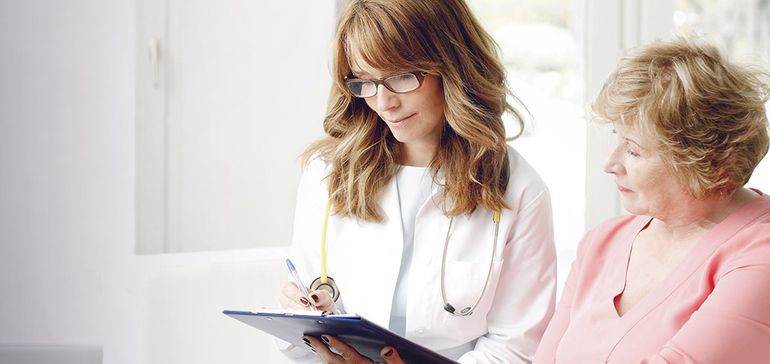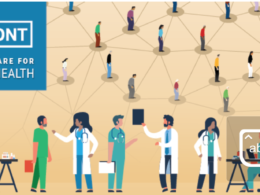Solv Health CMO Robert Rohatsch contends that digital healthcare transformation will help GPs finally get back to what most of us really want to do in the first place — keep patients healthy.
Editor’s note: Robert Rohatsch is chief medical officer of Solv Health.
HealthCare Dive
By Robert Rohatsch
June 22, 2022
Key messages by
Joaquim Cardoso MSc.
Health Revolution — Foundation
Primary Care — Institute and Digital Health — Institute
June 25, 2022
The doctor of the future will be different, and better
- One vision for the future of general care is this: They will finally be able to focus more on preventive care, which is sadly the last priority in many a busy medical practice.
- With much of triage, chronic care, and medical coordination streamlined and automated by remote, digital solutions, seeing a doctor of the not-so-distant future might not feel all that different from meeting up for coffee with a caring friend.
- Armed with data on your vitals, pharmacological care and other important aspects of your healthcare, your GP will meet you to learn about the social determinants of your health and to ask about your preventative health goals.
- Instead of being quickly shuffled through a busy medical office once a year or only when you are ill, your GP will constantly monitor your health and work with you as a kind of “healthcare coach” retained to help you keep performing at your best.
The focus on preventive care needs something else
- To achieve this vision, of course, we need more than consumer demand and technology.
- The third leg of the stool is realignment of healthcare compensation models.
- Instead of compensating general practice physicians based on the number of tests that they run or the number of procedures that they conduct, we need to shift toward value-based care (VBC) models that reward doctors for keeping patients healthy.
Structure of the publication
- Introduction
- There are five ways physicians can fail patients
- Digital health technologies lessen GPs’ load
- The doctor of the future will be different, and better
- The focus on preventive care needs something else
ORIGINAL PUBLICATION (full version)

The doctor’s visit of the future will be like having coffee with a friend. Here’s why
HealthCare Dive
By Robert Rohatsch
June 22, 2022
The rapid adoption of digital healthcare technologies like telemedicine, asynchronous chat and wearable diagnostic devices is seen by some as an existential threat to the future of general medical practice.
And it is true — there is a tectonic shift taking place in the American healthcare landscape.
I often caution my GP friends and colleagues that clinging to the traditional model of ambulatory care is a one-way ticket to obsolescence.
… there is a tectonic shift taking place in the American healthcare landscape.
But when I look at the digital technologies that are disintermediating the relationship between general practitioners and patients, I don’t just see cool gadgets and consumerized software replacing GPs.
On the contrary, I see greatly empowered physicians with the potential to finally fix what has long been broken about our healthcare system, and to do more good than ever before.
I see greatly empowered physicians with the potential to finally fix what has long been broken about our healthcare system, and to do more good than ever before.
As a physician and technology entrepreneur who has worked on both the provider and payer sides, I have a pretty good understanding of how American healthcare functions.
I contend that digital healthcare transformation will help GPs finally get back to what most of us really want to do in the first place — keep patients healthy.
I contend that digital healthcare transformation will help GPs finally get back to what most of us really want to do in the first place — keep patients healthy.
But only if we allow it. Here’s what I mean:

There are five ways physicians can fail patients
General practitioners are responsible for triage, low acuity care, chronic care, medical coordination and preventive care.
Regardless of our capability and commitment, performing optimally in all five of those areas just isn’t possible for solo practitioners and small clinics.
As a result, most GPs tend to truly excel in a couple of the five areas, and strive to at least provide adequate care in the others.
General practitioners are responsible for triage, low acuity care, chronic care, medical coordination and preventive care.
Regardless of our capability and commitment, performing optimally in all five of those areas just isn’t possible for solo practitioners and small clinics.
The unfortunate results are well-known …
… — long wait times, precious little face time between patients and doctors, confusing and sometimes incorrect communications and far too little focus on preventative care.
The fight to master all five areas of responsibility leaves doctors feeling overworked and burned out, and leaves patients feeling confused and neglected.
The fight to master all five areas of responsibility leaves doctors feeling overworked and burned out, and leaves patients feeling confused and neglected.

Digital health technologies lessen GPs’ load
Digital health technologies are doing for ambulatory healthcare what other B2B, cloud-based, API-first technologies have already done for other industries.
- Telemedicine and asynchronous chat, for example, can handle much of the work of triage.
- Remotely connected glucose monitors, digital blood pressure cuffs and consumer-grade smartwatches can record and analyze vitals to help manage chronic conditions like diabetes and cardiovascular disease.
Digital health technologies are doing for ambulatory healthcare what other B2B, cloud-based, API-first technologies have already done for other industries.
Technologies like these already allow general practitioners to easily and affordably leverage patient health data and insights, without advanced level skills nor costly infrastructure.
Technologies like these already allow general practitioners to easily and affordably leverage patient health data and insights, without advanced level skills nor costly infrastructure.
For GPs, this means higher certainty and reduced time investment across all five areas under their purview.
For patients, this means receiving convenient, cost-effective and quality care when and how they need it, just like they would expect in any other industry.
For GPs, this means higher certainty and reduced time investment across all five areas under their purview.
For patients, this means receiving convenient, cost-effective and quality care when and how they need it, just like they would expect in any other industry.
Digital healthcare technologies are on a tear, improving every day, with the benefit of billions in investment from the venture community.
In the coming years, we will see democratization of existing diagnostic technologies like genetic, epigenetic, and microbiomic testing, along with consumerization of newer technologies like embedded sensors, retinal scanning glasses and nanorobots.
Before long, much of what general practitioners and diagnostic labs do today will be taken care of through on-demand third-party services and devices.
In the coming years, we will see democratization of existing diagnostic technologies like genetic, epigenetic, and microbiomic testing, along with consumerization of newer technologies like embedded sensors, retinal scanning glasses and nanorobots.
Before long, much of what general practitioners and diagnostic labs do today will be taken care of through on-demand third-party services and devices.
When general practitioners have such easy access to best-in-class solutions in most of the five areas of ambulatory care, they will be free of much of the burdens that they carry today.

The doctor of the future will be different, and better
So what will GPs do with all of this newfound time?
One vision for the future of general care is this: They will finally be able to focus more on preventive care, which is sadly the last priority in many a busy medical practice.
One vision for the future of general care is this: They will finally be able to focus more on preventive care, which is sadly the last priority in many a busy medical practice.
With much of triage, chronic care, and medical coordination streamlined and automated by remote, digital solutions, seeing a doctor of the not-so-distant future might not feel all that different from meeting up for coffee with a caring friend.
Armed with data on your vitals, pharmacological care and other important aspects of your healthcare, your GP will meet you to learn about the social determinants of your health and to ask about your preventative health goals.
Instead of being quickly shuffled through a busy medical office once a year or only when you are ill, your GP will constantly monitor your health and work with you as a kind of “healthcare coach” retained to help you keep performing at your best.

The focus on preventive care needs something else
To achieve this vision, of course, we need more than consumer demand and technology.
The third leg of the stool is realignment of healthcare compensation models.
To achieve this vision, of course, we need more than consumer demand and technology.
The third leg of the stool is realignment of healthcare compensation models.
Instead of compensating general practice physicians based on the number of tests that they run or the number of procedures that they conduct, we need to shift toward value-based care (VBC) models that reward doctors for keeping patients healthy.
Instead of compensating general practice physicians based on the number of tests that they run or the number of procedures that they conduct, we need to shift toward value-based care (VBC) models that reward doctors for keeping patients healthy.
Our country’s health is ranked near the bottom amongst all developed nations.
I believe that now is the perfect time to demand a change.
I also believe that redefining the doctor-patient relationship and the compensation model of our healthcare professionals is the perfect place to begin.
I also believe that redefining the doctor-patient relationship and the compensation model of our healthcare professionals is the perfect place to begin.
Originally published at https://www.healthcaredive.com on June 22, 2022.
About the author
Robert Rohatsch is chief medical officer of Solv Health.













